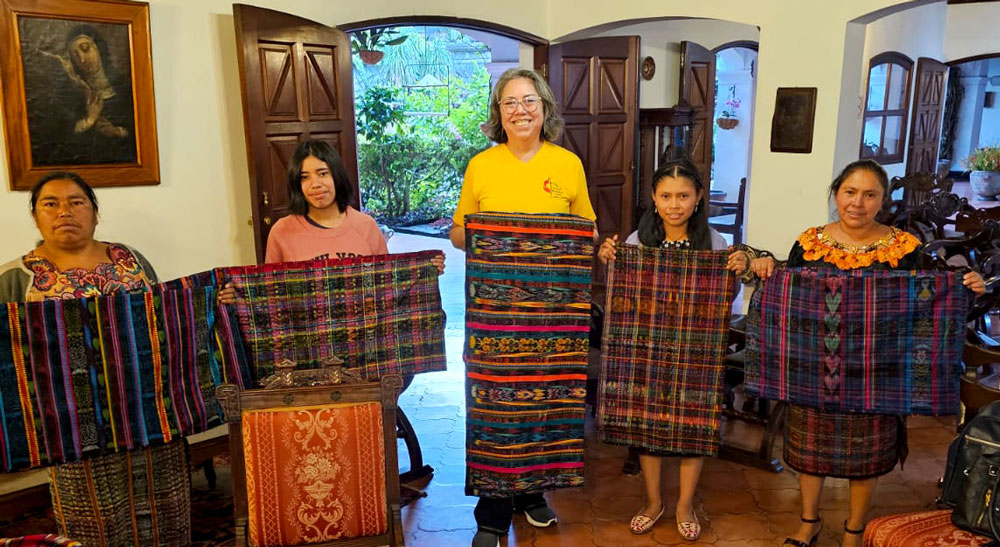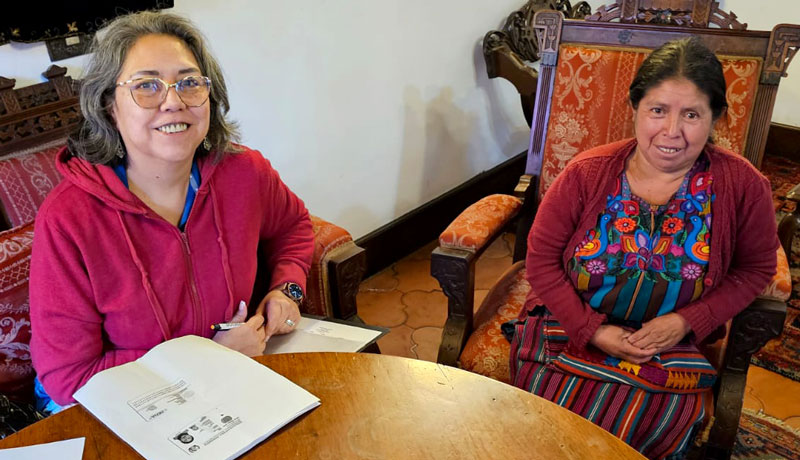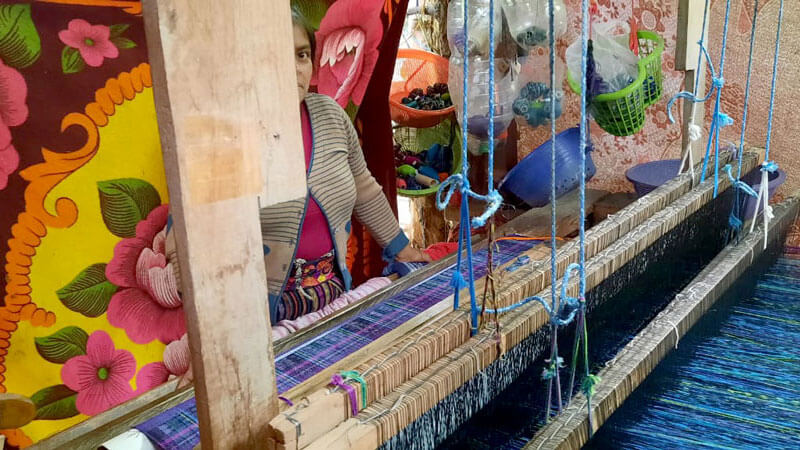
Lulu Ramirez (center) with a Quiche women’s cooperative participating in the Guatemalan Methodist Church’s microloan program to make traditional cloth for women. (Photo: Courtesy of L. Ramirez)
The King will reply, “Truly I tell you, whatever you did for one of the least of these brothers and sisters of mine, you did for me.”
Matthew 25: 40
GUATEMALA – One of our Guatemalan sisters, Tomasa, lives in a rural area of Guatemala. She speaks Quiche, her native language, in a country whose official language is Spanish. Spanish is taught in elementary schools, but Tomasa had no opportunity to attend school. (Some of the women I meet don’t even have a birth certificate). She understands Spanish but can’t speak it and has little chance of finding a job.
She was sexually abused years ago and delivered and kept her baby boy. Her only way of surviving was washing clothes for other families daily – handwashing piles and piles of cloths, outside in the cold weather, earning a mere 3-4 U.S. dollars per day.
But God had other plans for my Quiche friend!
In 2019, we started a microloan program in Guatemala with the help of friends from the Western Pennsylvania Conference of the UMC. This program assists several groups of women in rural areas. When we meet the women, we talk about the “Parable of the Talents,” and why it is important to use the talents and gifts that God has given each one of us. Then these groups of ladies discuss their options and agree on a project that they know could be profitable for them. We need from three to seven women for a viable project, learning to work together as one body in Jesus Christ.
We do not choose their project; they decide based on their own skills. Some choose animal raising, with chickens and eggs; others raise pigs. We provide training in their own language on feed, vaccines, building shelters, from someone who knows animal husbandry. Some choose embroidery, which they have practiced since they were little girls. And they come up with many other kinds of projects. They pay back the loan eight months later, with zero interest, and the loan revolves as long as they keep paying it back.
Then we’ll give opportunity to a new group of women to start a project.
Tomasa was part of one of those groups. She started buying material (textiles, thread) to make and sell what they call “tipicos” traditional Guatemalan outfits for women.


She reinvested her profits, buying more material and even her own loom, so her business kept growing.
She paid back her microloan and took out another one. She has paid back every microloan she requested. She is proud because she has become a respected woman in her community and she is so grateful because now her son can attend school, and she can afford his uniforms and shoes.
As we start building relationships with these women, we might not have long conversations, but they know they are heard, they are loved, they are enough, and they extend their trust. Language is not a barrier when sharing Jesus’ love with a hug or time spent listening.
Please join me in prayer for the women we serve, and I give you their own words to meditate on:
Dear God, help us to remember women in rural areas who have no access to education or job opportunities, who say: “Thank you, nobody ever asked us what we wanted or needed before.” We thank you for connecting us with their need and their creativity and will to improve their lives. For those who say: “We are not important, so thank you for coming here and listening to us,” may you sharpen our listening skills and keep their stories before us. For those who say: “Nobody cared about us, so thank you for being here,” may your presence connect us across cultures and miles. And when they ask: “Why do American people who don’t know us help us?” may it be that we are so grateful for your love, God, that our thankfulness and love overflows to include even those we have not yet met.
My God bless you abundantly!
Maria de Lourdes Ramirez Meneses (“Lulu”) is a Global Missionary with Global Ministries. Originally from Mexico, she began her missionary service in Nicaragua in 2017. Today she serves with the Evangelical National Primitive Methodist Church of Guatemala as a Volunteer in Mission coordinator. Her husband, Richard Mroczka, is a Western PA Conference missionary who also serves in Guatemala.
Global Missionaries
Global Ministries missionaries are a tangible connection between The United Methodist Church and mission. Through denominational or ecumenical ministries, missionaries bear witness to God’s presence all around the world. They are called by God and sent out to serve by the church, usually placed in a new cultural context beyond their country of origin. Missionaries engage in ministry that is defined by mutuality and partnership, seeking to expand the mission of God already present and active in people and places.
Explore the work of Global Ministries missionaries.
Make a difference. Make a gift.
Missionaries around the world: GIVE NOW

